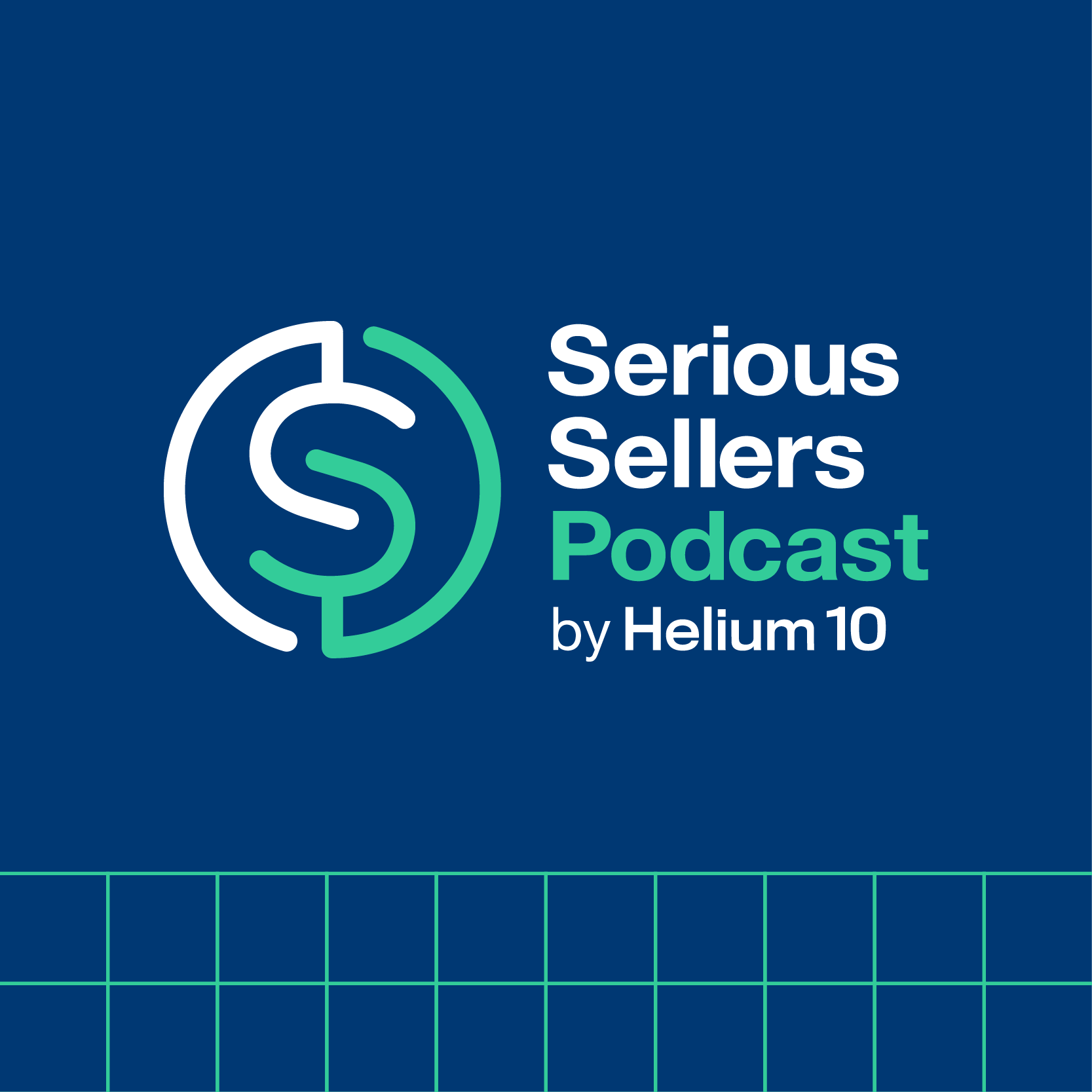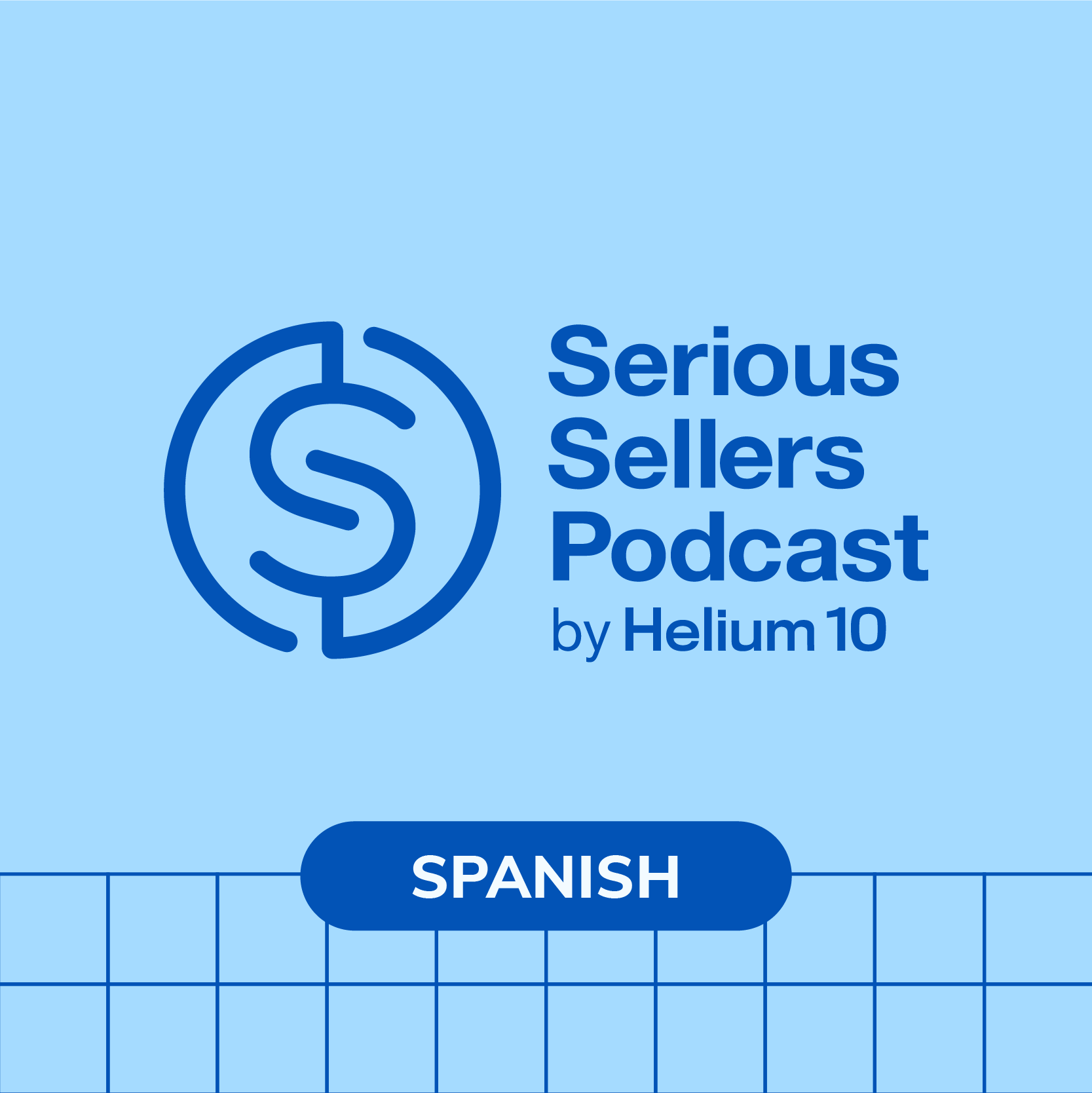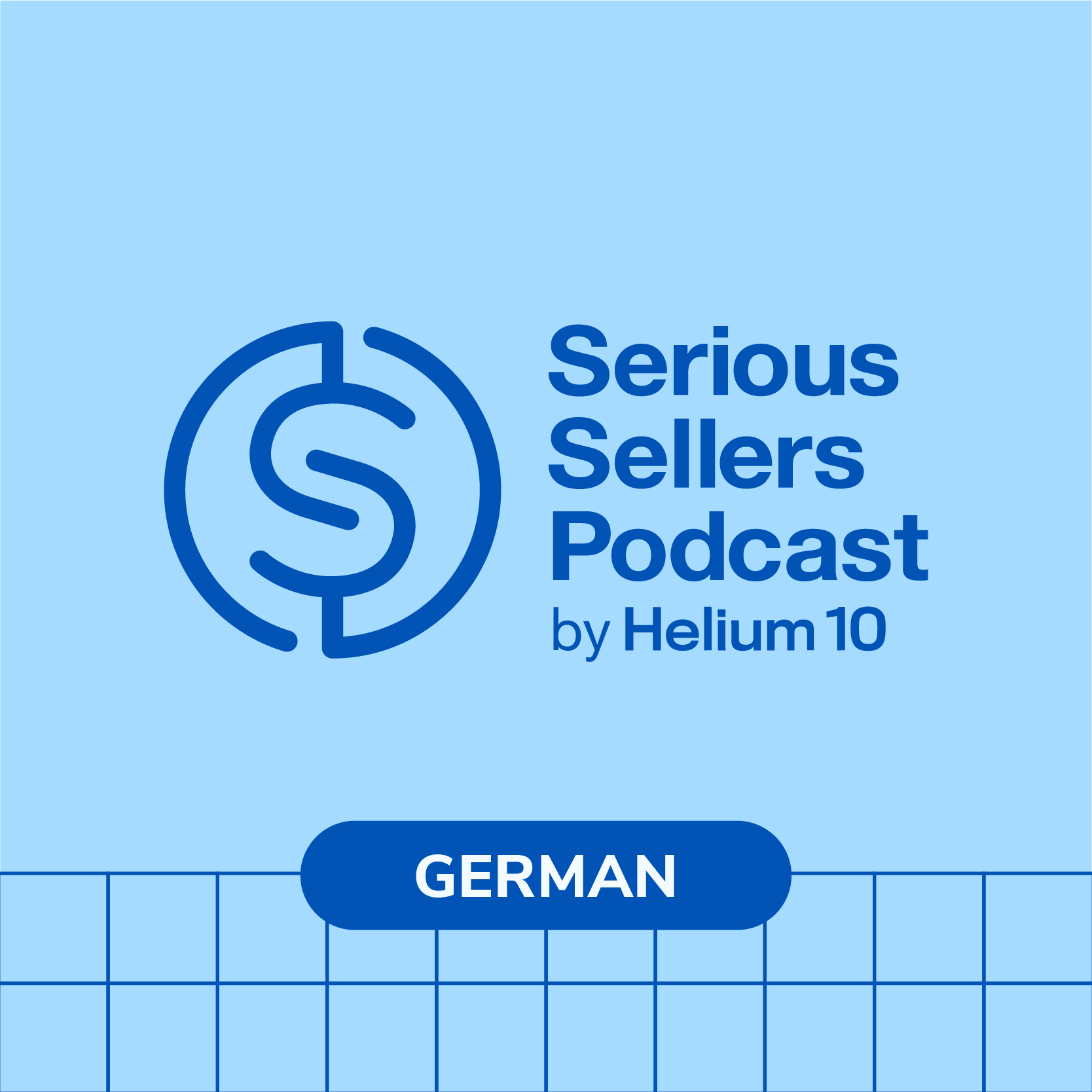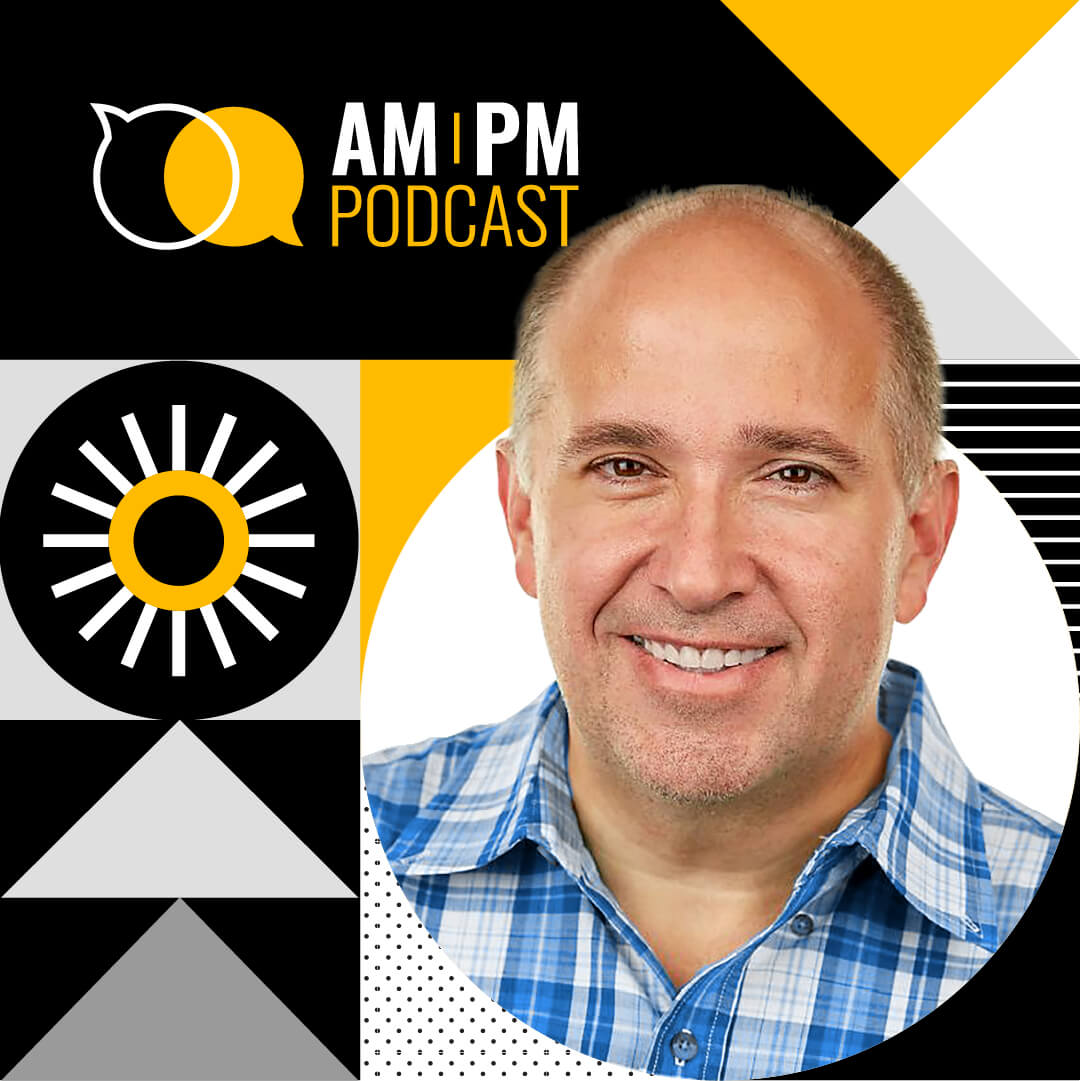#139 – Amazon Stories – Including a Shipping Wizard, a “Magic” Product Research Technique & Kevin King.

Today on the Serious Sellers Podcast, Helium 10’s Director of Training and Customer Success, Bradley Sutton presents another “Best Of” episode and this one offers a fresh take on some of your favorite Serious Sellers Podcasts from the last month.
In this edition we’ll get the inside story from a shipping wizard on how China is getting back up to speed after the delay caused by the coronavirus pandemic and take a closer look at a “magic” product research technique. Afterwards we have the opportunity to hear from an expert on Amazon keyword ranking strategies, and then finish with the latest from eCommerce super-star Kevin King, including why he thinks Project X and the Freedom Ticket work so well together.
Once again, here’s an episode you aren’t going to want to miss. It’s like cheating; getting so much information from Amazon experts at the top of their game.
In episode 139, Bradley Sutton presents another “Best Of” edition of the Serious Sellers Podcast.
- 01:00 – China’s Shipping Backlog
- 02:00 – Here’s How All the New Amazon Sellers Work in Your Favor
- 03:30 – “Fast Means Expensive, Slow Means Cheap”
- 04:50 – 3PL Logistics
- 06:00 – A European Seller’s Checklist for North America
- 07:25 – Alina’s Search Techniques
- 09:15 – What Are the Opportunities for Amazon Sellers in Europe?
- 10:20 – At the End of the Day, You Need a Good Product
- 11:35 – A “Magic” Product Research Technique
- 13:40 – Here’s How “Launch and Scale” Works
- 15:20 – Selling More of What is Already Selling
- 17:20 – How Project X Complements The Freedom Ticket
- 18:15 – Kevin’s Take on Amazon’s Recent Changes
- 19:00 – Brand Analytics and Helium 10 are Multipliers for Amazon Sellers
- 20:00 – “How to Get Reviews” is Always a Trending Question
- 21:20 – Pinterest and TikTok Might be the Future
Enjoy this episode? Be sure to check out our previous episodes for even more content to propel you to Amazon FBA Seller success! And don’t forget to “Like” our Facebook page and subscribe to the podcast on iTunes, Google Play or wherever you listen to our podcast.
Want to absolutely start crushing it on Amazon? Here are few carefully curated resources to get you started:
- Freedom Ticket: Taught by Amazon thought leader Kevin King, get A-Z Amazon strategies and techniques for establishing and solidifying your business.
- Ultimate Resource Guide: Discover the best tools and services to help you dominate on Amazon.
- Helium 10: 20+ software tools to boost your entire sales pipeline from product research to customer communication and Amazon refund automation. Make running a successful Amazon business easier with better data and insights. See what our customers have to say.
- Helium 10 Chrome Extension: Verify your Amazon product idea and validate how lucrative it can be with over a dozen data metrics and profitability estimation.
- SellerTradmarks.com: Trademarks are vital for protecting your Amazon brand from hijackers, and sellertrademarks.com provides a streamlined process for helping you get one.
Transcript
Bradley Sutton: On today’s best of podcast episode, we’re going to get the inside story on China getting back up to speed with shipments, we’ll take a closer look at a “magic” product research technique, and finish with why Kevin King thinks Project X and the Freedom Ticket program works so well together.
Bradley Sutton: Hello everybody and welcome to another episode of the Serious Sellers Podcast by Helium 10, and today, we have another Best of Podcast episodes. All right, we’re going to go into all your favorite episodes of the past few weeks. Now, for over a month, we’ve been talking about what the coronavirus might mean for shipping and logistics coming out of China. Now, the situation in China is starting to return to what it was before the pandemic hit. Today’s first podcast features Refael Elbaz from UniCargo, who has boots on the ground in China and is an expert on the subject. Let’s start off by hearing what Refael has to say about how the shipping situation in China is starting to return to normal.
Refael Elbaz: They’re going to have a backlog with orders coming out of production. And it depends how big you are and depends how important of a client you are to the factory to put you up in first priority or last priority. The effect is still out there. We expect the effect to be with us at least until May, June, even though factories will come back to normal, capacity will rise again. There’s going to be a very big backlog and very big orders stacking up with those suppliers
Bradley Sutton: The large number of new sellers on Amazon creates a lot of competition. Here’s one way that the increasing number of sellers can actually work in your favor.
Refael Elbaz: With time, freight forward especially with Amazon-dedicated freight forwarders, they can start to build, we call it hybrid products, for Amazon sellers. The regular airfreight where when you book a cargo with an airline, you book it as an airport to airport as a freight forward. We arrange all trucking partners to pick up and all trucking partners deliver. With air consolidation, what happens is we figured out that there are a lot of Amazon sellers out there, and they’re all going to the same location, which are Amazon facilities. We started, not only us but Amazon-dedicated freight forwarder, building air consolidation. What it means, basically, we will have a weekly or biweekly booking with airlines where we buy crates with 3,000 and 4,000 kilos, three or four tons. And what we do is we combine a lot of sellers on that flight. You can have a 100 kilo, he can have 200 kilos, this guy can have 400 kilos and basically, we already booked the slot for three and four ton. And we bought the air freight price based on real fault on. Instead of booking your 100 kilo on yourself with airline; we book it on our 3-ton slot, which means the price for their freight for the actual moving the goods international is going to be reduced by a lot.
Bradley Sutton: Sometimes making sure that you don’t run out of stock on Amazon is worth the added expense of a rush shipment.
Refael Elbaz: Express shipping, we will usually use either DHL, FedEx, or UPS. The big brand names; fast means expensive and slow means cheap. Air Express is the fastest. Obviously, we can have a next-day services. We have services that your cargo is now with the factory, and tomorrow it’s going to be in Amazon in the States. Deliver it to Amazon, that’s the highest price. And you have a regular express service which is about two, three, two to four business days from pick-up to delivery. And you would use that service if you ever fairly smaller order, like a 50 kilo, a hundred kilo, or if you need it very fast. We have clients selling 1000 units a day, very big clients, and for them, being out of stock is not worth any price in the world. They’ll pay anything to get big shipments into Amazon as fast as possible.
Bradley Sutton: Of course, you don’t always have to ship straight to Amazon. Here’s what Refael has to say about 3PLs.
Refael Elbaz: I would say it depends on the size of the center. Well, the small- to medium-sized sellers ship directly to Amazon because it’s cheaper. You don’t have to go through another stop in a 3PL. Most of them will ship directly to Amazon. Today, I would say from the small- to medium-size sellers, 90% of them shipped directly to Amazon, request to ship directly to Amazon. The bigger sellers are doing shipments by the container load, and with Amazon storage prices, it becomes very expensive to keep huge amount of stocks on Amazon. These guys send it to all 3PL for unloading; we build their parts on our 3PL and then keep some parts in storage, and then like drip feed. Yeah, let’s do Amazon with sales and you know fill the requirements. Well bigger centers would tend to send goods to a 3PL, even storage just because they have bigger shipments.
Bradley Sutton: Next up is Alina from AZrank. Alina is an expert on Amazon keyword ranking strategies. For one of our Project X products that we used her for, we got to page one on a keyword with thousands of searches with only 11 people searching, finding, and buying it. We all know that selling on Amazon or the Serious Sellers Podcast isn’t just a North American phenomenon. Here’s what Alina has to say about European Amazon sellers who might want to try to sell in North America.
Alina Vlaic: Okay. You don’t need to have an LLC. Currently, I am selling on a Romanian company. It works perfectly like this. You can also do it as an individual, but with the business account on Amazon; you can also do that. But it’s more difficult because every country has different taxes for you to pay, like when you have to declare your income and stuff like that. If you have a company, it should be easier because there are services that can keep the books for you. First, I would say, have a company established in your country, and then, open of course an Amazon account; you can very well use a bank account established or opened in your country. You don’t need a USA bank account. And that’s pretty much it.
Bradley Sutton: It’s always nice to see how other sellers use Helium 10’s tools. Here’s Alina talking about how she uses our Xray and Frankenstein tools with her Amazon title research techniques.
Alina Vlaic: First of all, we search on Amazon for the main keyword. And how do I know the main keyword? What’s the product name? Let’s say my famous milestone blankets. I know everybody knows it’s called milestone blanket. After I search after the milestone blanket, a page of results comes out, and I am going to choose the top five sellers, the top five listings that are selling the most. After that, I’m going to open them all in different browsers, in different tabs, and copy paste all the titles, the entire title, into a tool that I use, it’s called wordcounter.net. Actually, Frankenstein, I think Frankenstein from Helium 10 does this as well. After putting all the titles in there, I will extract the repeated words and combination of two and three words. Basically, that’s what word counter and Frankenstein do; they show you how many times a certain word or phrase or a combination of two and three words are repeated in those cycles. And I sort them out and I decide: okay, if all these five listings have these words and these combinations of course, besides milestone blanket, that of course has to be in there, but all the other there are repeated in all five of them means that there are important.
Bradley Sutton: Alina is from Romania, and she’s got her finger on the pulse of European sellers. Here’s her take on the opportunities that exist for Amazon sellers in Europe.
Alina Vlaic: What I would say would be start selling in Europe if you aren’t already and don’t go to the UK market because everybody is focusing on targeting UK because of the language. Go to Germany. Even the language barrier is more difficult, but the opportunities there you’re going to see, it’s amazing. You can use Helium 10 to discover those because you guys have a lot of tools that analyze this marketplace and all the European ones actually, but definitely you will find some awesome opportunities. There are really low competition and good volume markets.
Bradley Sutton: Now, we’re going to speak with one of the Serious Sellers Podcast’s favorite all-time guests. Tomer Rabinovich who is an eCommerce superstar and former professional magician is going to be sharing with us a magic product research strategy that is so cutting-edge. You’ve never even heard of anything like it. We’re always talking about keyword research, but at the end of the day, you’ve got to have a product that people want to buy. Here’s Tomer’s take on that.
Tomer Rabinovich: Yeah, so product search, I believe, we never talked about this actually, Bradley, but I believe this is the number one most important thing when it comes to selling on Amazon. The reason being that you can do everything wrong. You can have a bad listing, you can have not even getting index, not running PPC correctly or whatever it is. But if you chose the right product, a lot of times you will still get sales, and sometimes a lot of sales, and it happens a lot in many different accounts that they looked at. But if you chose the wrong product, everything needs to be right. Do you have beautiful images? You know how to do PPC, manage your inventory. In keyword research, you do everything correctly, but you still don’t sell anything because you wanted a saturated product or a product without any demand. You won’t sell anything. That’s why I do what I mean. Everyone thinks product research is basic because that’s what you learn in different courses and things like that. But no one talks about product research. Once you are established, once you have a few products, once we have a product line, how do you expand that product line correctly?
Bradley Sutton: Tomer has always been known for his keyword strategies, but here’s a cool new product research technique that he’s developed.
Tomer Rabinovich: Yeah, so this strategy is something that I’ve been preaching for the past, I would say, three years. I spoke about it at very small, intimate events. I don’t think we spoke about it at any big events I spoke in. Because I kind of keep it to myself and also to the people I consulted and things like that. Almost all of them are using this method because it makes sense. I call it launch and scale. Basically when you think about product research, you need to think about the end. You need to have your end goal in mind. Are you aiming to do $10,000 a month with this product in sales, or twenty, or fifty, or what is going to happen with time? And how long is it going to take you to get there? And are you happy with that?
Tomer Rabinovich: We have a list of products that we want to launch, and we prioritize them in different ways, which if we’ll have time, we can also discuss. But launch and scale basically mean I need to see that I can launch this product relatively easily. If I get 10, 20, 50 reviews, as soon as I get there, I know we’ll have organic sales, and once I do get there with the organic sales, I’m going to get reviews, I’m going to grow the product. And after a while, hopefully, I can scale this product. This is the basic theory behind this. You want to make sure there is room to get in with 10, 20, 30 reviews, get organic sales. When I say organic, that means organic sales. When wee piece it together, you will start getting your reviews organically and everything, and then you will scale once you have more reviews, once you have some more history, optimize your PPC, things like that, and then you can really scale this product.
Bradley Sutton: It’s always exciting to get an inside peek at the workings of an eCommerce mastermind’s techniques.
Tomer Rabinovich: My method is to look for at least two, that are less than a hundred reviews over a hundred days, and are you doing over 2K a month. And also I make sure those are, if sold by FBA, I don’t want to compare myself or anything like that. By Amazon, or by Merchants, or anything because that is not comparing apples to apples, right? That is not a really fair comparison. I want to see some that are doing the same method as I am doing. I don’t mind having them on the first page. They don’t bother me. If I see them, that’s okay. I just want to see those that I look for basically. As long as I see those, then I can look for the scale. Okay? The other products, so let’s say in this case, let’s say the goal is to get to $10,000 a month. Okay? Let’s say that’s my goal. I need to look for two more products. Two additional products, that’s already doing over 10K a month, have less than 350 reviews, and they’re also over a hundred days and sold by FBA. If this happens, if they see two more, two additional products that are over $10,000 a month have less than 350 reviews. And I can estimate how long it’s going to take me to get to 350 reviews. You can use –look at the review velocity in Xray, you can kind of estimate how long it’s going to take you to get there with this product. And if you’re happy with that, then this means that you can launch this product, get to 2K, start getting organic reviews, and then scale up. And the difference between this method than any other method that they ever taught is, I’m not looking for reasons to disqualify the product. I’m looking for reasons why you should go after this product.
Bradley Sutton: We know that Amazon wants us to build brands, but sometimes the best way to scale up is to sell more of whatever’s already selling.
Tomer Rabinovich: Let’s say you launch a yoga mat, okay, let’s say you’re killing it and it’s only really well and everything is fine. And then he said, “Oh, I sold really well in a yoga mat, I’m going to launch a yoga ball next because they want to build a brand. That’s what Amazon wants me to do. They want us to build the brand and everything, and I can cross-sell between my customers and everything. Now, that’s okay. You can do that if you want to. What I do– you can also do that at the same time, but what I like to do is something we call selling more of the same. If the yoga mat for $10, let’s say launched it, and it works well, what I’m going to do next is I’m going to launch more colors, more sizes, more a two-pack, three-pack, four-pack for all of those things. I’m going to do a lot of research. Okay? I’m going to do a deep research analysis and everything to make sure those are actually good ideas. Once, I’m going to check which competitors, what variations they have, what they’re doing that is actually doing well, and then I’m going to launch more of the same products of the product I could just have because if you think about it, it’s going to be the easiest launch ever because you want all the keywords. You can see from the research you did. It’s going to be probably very simple photography because you know the product and you already did it once. It might be just graphic designing and Photoshopping everything to change the covers, or pack, or whatever. It’s really important that once you get a good product, once you get going with the product, don’t just go to the next product in the line. First, do everything you can do, maximize the sales and revenue and everything out of that one product.
Bradley Sutton: Finally, we’ve got one of the most popular Serious Sellers Podcast guests of all time. Kevin King, a true e-commerce superstar who’s going to let us know what he’s been up to and give us his top tricks and strategies for 2020. Here’s what Kevin has to say about the differences between the updated Freedom Ticket program and the new Project X.
Kevin King: Project X. You know, Project X is a little bit different approach. With Bradley and Tim doing Project X, that’s more of a case study. Freedom Ticket is more of a straight-up training. Freedom Ticket is lot of the fundamentals and the groundwork, and Project X is great for seeing the implementation. Plus, Tim brings a little bit different approach than some of what I teach in Freedom Ticket, which is great for you guys. If you’re not doing both, I highly recommend, if you’ve only been doing Freedom Ticket, you need to go to YouTube, subscribe, and take a look at the Project X or vice versa. If you’ve only been watching Project X, take a look at Freedom Ticket because I think by seeing two different approaches in two different styles, there’s some overlap. I think it’s going to make you much more well-rounded and give you a lot of good ideas and inspiration for how you can do your Amazon business.
Bradley Sutton: Amazon is constantly changing. Here’s what Kevin feels are the biggest recent changes with their selling ecosystem.
Kevin King: The biggest change, probably is the way people are doing launches now is completely changed and the takeaway of the customer data, I mean back on that calendar business, one of the benefits I would have is if I sold 20,000 calendars through Amazon or something, I would have 20,000 names and addresses that I could then download and actually send out my flyer to and sell them additional products and additional things. It wasn’t just buy our calendars. It’s like I said, we had over a hundred different ones, the ones that we were basically just a distributor of, and that was taken away for most accounts.
Bradley Sutton: Okay. Now, Kevin is going to talk about what he feels is one of the most positive changes that can help sellers on Amazon.
Kevin King: Brand Analytics is huge. I mean, Helium 10 is my tool of choice. I’m not just saying that because I do some training with you and stuff, but even if I’m just some random guy, wasn’t involved on the training side or anything, I would still use Helium 10. I like Helium 10 because it’s very robust and gives me the data. But there’s a few things that you just can’t get. I mean there’s some software tools that may provide some of this data, but they’re doing it without Amazon’s permission and Helium 10 goes by the book and does what’s allowed. And I like to go to Brand Analytics because that’s coming from Amazon. They have some additional data. Like I said, some people scrape that and put into a tool, which you’re not allowed to do, but there’s some additional data in there that can be very, very valuable, like the conversion rates and checking on products. You can take that and interpolate that and put that into some formulas where you can really see what’s converting and what’s not, and it takes a lot of the guess-work out. If you really know how to use Brand Analytics, it can be a huge advantage to you.
Bradley Sutton: After you’ve found a product and it’s starting to gain some traction or a lot of sellers, the next question is how to get reviews.
Kevin King: And then one question I get in the Freedom Ticket when I do the Q and A is like Freedom Ticket extra or something. The number one question I get in the Freedom Ticket when I do the Q and A like Freedom Ticket extra or something, I’m going to do those Q and As. People are always like, “How do I get reviews,“ “What’s the number one way to get reviews?” Well, there’s a couple of legitimate ways. One is if your brand right, the brand registered, you can use the Vine program. Another way is you can use the earlier, you know, pay the 60 bucks. You don’t have to be around registered for that and get the first five. But the number one thing is you’ve got to put on a damn good product. I mean, if you’re putting out a good product that solves someone’s problem and makes them happy, you’re going to get reviews and then it’s a numbers game, then it’s just become, you got to sell enough, you know, one to 2%. Naturally you’re going to leave a review. You can use, you know, if you want to use follow the Follow-Up tool from Helium 10 and try to bump that number up a half a point or another point or something if you want to and just got to sell. And that means you got to drive outside traffic, or you got to have an audience already or you just got to sell gaming. The system I think is the wrong approach.
Bradley Sutton: As Amazon grows, it’s important to grow with it. We all know that Amazon loves outside traffic. Kevin might not be a youngster, but one of the reasons that he’s been so successful with eCommerce is his willingness to evolve and continually get better.
Kevin King: It depends on your category, but especially if you’re in beauty. Pinterest is a highly underutilized thing, and I’m about to test this, but I know a couple of people that are crushing it on TikTok. If you’re not familiar with TikTok, it is probably the number one video platform right now. The young people get addicted to it and just lost it in with all the crazy stuff. But I don’t know exactly how to do TikTok. I’m actually going recently went to a conference where someone was speaking about, I’m anxious to implement some of those strategies because I think that’s a wide-open space right now. But Pinterest is another one that a lot of people are underutilizing I think to drive outside traffic. Obviously, if you have your own house list in, for example, my counter business where I have a list of messengers who bind forever, one of the things we’re going to do next year is to leverage that and drive that traffic to Amazon and go through, go to helium10.com/gems, and use some of the keyword tools and stuff there to actually rank a whole bunch of calendars besides ours and do a lot of customers who bought this, bought that and really blow that up.
Bradley Sutton: Well, there you have it. Those were the top episodes of the recent weeks. We’ve got a lot of great new episodes coming your way, including the upcoming episode next week, which will launch our new theme song that’s actually made by an actual artist that’s on the charts who made a theme song for the serious elders podcast. We’re also going to go into a lot more cutting-edge strategies or those of you, especially the Amazon seller, and we’ve got a special announcement. I don’t want to get into too many details yet, but we’re having a podcast blast from the past slash relaunch, and I might have said too much already. Make sure to listen out for that announcement in the coming weeks until the next episode. I’ve been your host, Bradley Sutton, and we’ll see you next week. Quick note, guys, don’t forget that regardless where you’re listening to this podcast, whether it’s on your iPhone or on Stitcher, on Spotify, that you hit the subscribe button so you can be notified every time we drop a new episode.
Achieve More Results in Less Time
Accelerate the Growth of Your Business, Brand or Agency
Maximize your results and drive success faster with Helium 10’s full suite of Amazon and Walmart solutions.








